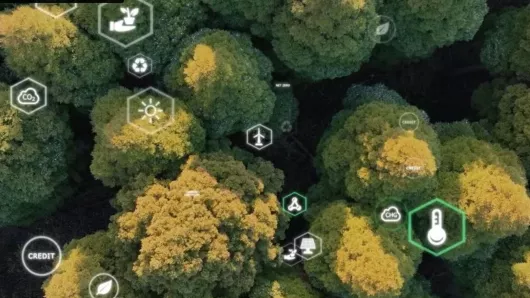In the summer of 2024, our flexibles team in Morristown, Tennessee became the first packaging facility in Sonoco's North American portfolio to earn the International Sustainability and Carbon Certification known as ISCC Plus.
This is one example of a Chain of Custody Certification, a credential that helps companies verify that their materials, whether packaging components like fiber, plastic or aluminum, or ingredients like palm oil, are responsibly sourced. This chain of custody usually extends all the way from the source of the raw material through conversion into an intermediary product and then into its final form.
To apply for and obtain your ISCC Plus certification, a producer must demonstrate knowledge and success implementing a chain of custody standard. Sonoco uses a chain of custody system known as the "mask balance" system, to certify chemically recycled raw materials. This approach tracks the specific sustainability characteristics of circular or bio-based material through verifiable bookkeeping. The chemical industry has found value in using it to help build and promote more circular solutions worldwide; a stepping stone towards more robust standards for chemical recycling technologies.
Chemically recycled or bio-based feedstocks are typically blended with virgin sources due to current technical limitations of most manufacturing processes. So determining the exact recycled content can often be impractical or economically infeasible. Using mass balance however, we change our approach and outlook in an otherwise complex system, and we'll further unpack that here today.
Mass balance is not a new system, it's a well-known chain of custody model that's been used for years to introduce, for instance, sustainably sourced wood into furniture or organic cotton and textiles. Sonoco uses a similar approach with recycled fiber and certified virgin fiber to manufacture certified paper and packaging. The part that is new for us for the manufacturing industry, is the application of mass balance in assigning recycled content values to outputs of the chemical recycling process where recycled feedstock, such as plastic, is mixed with virgin fossil feedstock to develop new processes from the plastic waste.
Consumers have long been demanding more sustainable sourcing of materials, calling on companies to reduce the amount of virgin resin in their products. Brand owners who've subsequently made these commitments and started purchasing packaging with recycled content are looking for waste to verify their material sourcing and mass balance is one way for them to do that.
Some things to keep in mind with mass balance and the ISCC certification, are that producers must show that the means and methods of sourcing materials does not impact their overall environmental performance. Things like carbon emissions, for example. Further, every supplier we work with in the value chain must also be certified, forming a true partnership amongst raw material suppliers, converters, and brand owners. So, there's certain checks and balances in place to ensure proper procedures are followed.
Is it a perfect system? It depends on what rules are being implemented. In Europe, for instance, they're working to develop more stringent parameters for both mechanical and chemical recycling. One that accounts for strong physical and chemical traceability, and criteria for the plastic being used. With the right parameters, however, mass balance can help increase and promote recycled content in the circular economy and encourage consumers to do their part.
So, as technology advances and record keeping does too, we could further refine our system and continue driving toward more transparency with better packaging solutions worldwide, moving towards more robust chain of custody standards in the future.
So now that we've unpacked it, what are your thoughts?
Can models like mass balance help pave the way towards a more circular system? It would allow us to better understand that the circular recycled content in a product contributing to the reduction of virgin resin. Manufacturers and brand owners could better meet their recycled content targets, and communicate certain sustainability aspects to customers. On the other hand, the methodologies used must be developed carefully and transparently to ensure credible unpack claims can be used to drive consumer decision making, prevent greenwashing, and allow the scale up of circular solutions further growing and enabling the circular economy and laying the groundwork for a better, more sustainable future.


